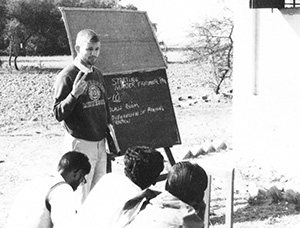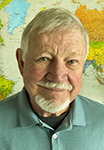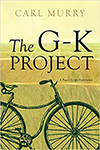Talking with Carl Murry (Pakistan) about THE G-K PROJECT
Carl talks about his new book
•
Carl, where and when did you serve in the Peace Corps?
I served in East Pakistan, which is now Bangladesh, from 1962 to 1964. I also served as Associate Peace Corps Director for agriculture, education and appropriate technology in Swaziland from 1978 to 1981, and served as a trainer for CAST, CREST, and pre service training in the 1980s.
What was your Peace Corps project assignment?
Training agriculture extension agents in the Ganges-Kobadak Irrigation project. The assignment evolved into developing farmer Clubs to support new and improved agriculture practices in their areas, starting a technical library, publishing a monthly newsletter, Recognizing “Master” farmers and being the team leader.
What kind of work did you do?

Carl in the classroom
Initially we set up irrigation committees to distribute water from the tertiary canals to small, highly fragmented fields. This required a high level of cooperation. Each committee discussed their agricultural concerns such as; vaccination of chickens, budding and grafting citrus, controlling water hyacinth, pest control, fertilization etc. and since the canals were not functioning, we tried to address those concerns with disappointing results.
The irrigation committees evolved into farmer (chasi) clubs which met monthly for topical lessons, test and demonstration plot evaluations, discussions, fellowship and a cinema offering. With 10 chasi clubs in a ten mile radius of my base, I spent a lot time riding my bicycle. I started a technical library and published a monthly newsletter for the extension agents. The chasi clubs expanded to twenty.
What is your educational background?
B.S. in Crop Production, General Secondary Teaching Credential, M.A. in Agriculture Education, and PPS Counseling Credential.
Did your college education help you as a Peace Corps Volunteer?
Yes. The combination of my B.S. and practical experience of growing up on a farm was equally important to the job, but the degree gave me the knowledge and confidence to assist at a higher, more impactful level.
What have you done since the Peace Corps?
Taught vocational agriculture at Sonora, Summerville and Rio Vista high schools in California. Worked as a crops advisor for a Cal-Poly team on an AID/World Bank project to improve vocational education in Thailand from 1968-1971. Served as APCD for the Peace Corps in Swaziland 1978-1981. Periodically worked as a trainer for Peace Corps pre-service programs (CAST, CREST, and Orientations in the mid eighties. Counselor at Sonora High School and Curtis Creek Elementary schools. Working on my 17 acre ranch purchased in 1965 and just sold in 2017. I am now retired.
What inspired you to join the Peace Corps?
My parents migrated from Texas and Oklahoma in the mid 1930s to earn a living following the crops as farm labor. They met in Hughson CA and was married in 1938. My mom was 16 and dad 19 We moved to New Mexico and homesteaded with relatives before returning to sharecrop and make enough for a down payment on a small farm that grew into an 80 acre fruit ranch. Living in poverty for so long and finally pulling themselves up by their bootstraps they were not in a position to help me with college and wanted me to join them in farming. A football scholarship gave me the opportunity to attend college and my world grew. The Atom Bomb was being tested in Nevada and we could feel the earth shake and see the mushroom cloud rise adobe the Sierra Nevada mountains as we raced for dominance with the ever present threat of nuclear attack looming. Carol, my first wife, and I wanted to continue to expand our world and most of all, do something to reduce the threat of war and evidently so did many others as The Peace Corps was born.
How would you describe your book in one sentence?
It is an effort to capture and preserve events and experiences that were invaluable to my growth and to promote the Peace Corps through my appreciation.
What prompted you to write the book?
Being 81, it is time for me to sort through my collection of old letters, journals, records and mementos which will tossed into a dumpster without some written context to explain them. I started writing notes and realized I needed to make it more interesting and about halfway through, maybe others might be interested and contacted the Peace Corps. Through Marian Haley Beil I learned of Peace Corps Writers Imprint and her encouragement and assistance made it possible.
How long did it take for you to write the book?

Carl Murry
I began sorting and organizing the material in the fall of 2019. When COVID-19 restrictions began in March 2020, I realized that I had time to write and began trying to make it interesting to my grandkids. My son, Sean introduced me to the basics of google docs and I wrote most days, usually 2 to 3 hours per day. My wife, Linda, was patient and encouraging trying not to engage me in conversations while I was writing but it must have been difficult having this lump sitting around with just the two of us. It took about 7 months to write.
During the process did you belong to a writers group and share reading and critiquing or have any other way of bouncing off your writing and thinking?
No, but I certainly appreciate the value of being able to do that after conferring with Ryan Archer on a developmental and copyright edit and Dania Zafar on book design. I do not have the skills and training of a writer but I do have a lot of wonderful stories to tell.
What are you doing to promote your book?
I do not know what my options are and have not thought about it much to this point. I have wondered about how to let my fellow G-K volunteers know about it because we have not kept in touch. The book was not written to make money but I hope many people read it and it stimulates dialogue and sharing of feelings and ideas.
Thank you!
•
 The G–K Project: A Peace Corps Experience
The G–K Project: A Peace Corps Experience
Carl Murry (Pakistan 1962–64)
A Peace Corps Writers Book
184 pages
$7.95 (paperback)
Carl It is good to record those experiences from a no longer existent East Pakistan. If not written down how will your grandkids ever know of your great adventure. Where did you go to college? Where did you train for PC service? Can we get the book through Amazonor where?